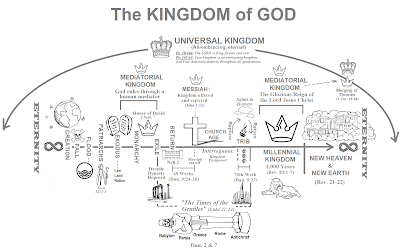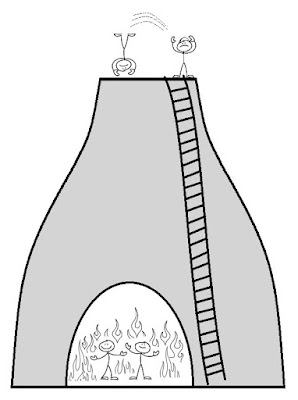I created this chart in conjunction with our messages on the Kingdom. The chart emphasizes the distinctions between the Universal & Mediatorial Kingdoms of God and provides an overview of God's Plan for the Ages. Also emphasized is Daniel's 70 Weeks Prophecy and "The Times of the Gentiles."
Monday, July 26, 2021
Wednesday, July 7, 2021
Bulletin Insert: Our Returning King (July 4, 2021)
Our
Returning King
(Pastor Terry L. Reese,
Valley GBC, Armagh, PA; 7/4/2021)
I.
The Old Testament Kingly Office: its nature & history.
A. The King, as a mediator, had the authority to reign over the Israelite Kingdom on God’s behalf, enforcing God’s Torah Laws.
His powers included executive, judicial, & military functions.
>But he was NOT the Supreme Legislator. He was bound to observe & obey the Law of Moses—not be a law unto himself!
B. The
Monarchy’s unfolding history & Constitutional basis.
1. The origins of the Monarchy.
Israel
was initially a direct Theocracy, with God employing Judges &
Priests—but the people desired a King (1 Sam. 8).
Earlier, Gideon had refused the crown (Judges
8) and Abimelech had briefly instituted a Canaanite-style monarchy (Judges 9).
Their
request not intrinsically bad; the sin was in…
1) …dissatisfaction
with God’s method of rule;
2) …their
desire to be like the nations.
2. The Monarchy was anticipated by the Law: Deut. 17:14-20.
The
standards for the King, who was not to imitate the heathen:
i.
He had to be Israelite (Deut. 17:15), a son of the Covenant.
ii. He must not place his trust in a large military organization and multiply horses (Deut. 17:16; cf., Ps. 20:7).
iii. He was not to multiply wives (Deut. 17:17; cf., 1 Kings 11:3) who would tend to turn his heart away from the LORD.
iv.
He was not to amass great personal wealth (Deut. 17:17).
This
would lead to a divided allegiance (Luke 16:13, Matt. 6:21).
v.
He was to transcribe a personal copy of the Law (17:18).
This
would promote thoughtful mental interaction with God's Law and revealed will
for the nation that the king was to rule.
vi.
He was to read this law throughout his lifetime. As king, he
MUST
know & meditate upon God’s word (Deut. 17:19-20)!
In
short, the King was to serve as the model Israelite.
·
His
power was limited; he was to avoid arbitrary tyranny.
·
He
was to be a Law-keeping Israelite.
·
He
was not to walk as the “god-kings” of the nations.
4. The House of David of the Tribe
of Judah.
a. God allows the people to have a king—but warns them of the perils of kingship (1 Sam. 8).
b. Saul, a Benjamite donkey driver (1 Sam. 9), becomes Israel’s first king. He begins well, but ultimately is rejected (1 Sam. 15).
c. God chooses a Judahite (Gen. 49:10) shepherd, David—a man after His own heart—as the next king (1 Sam. 16).
d. The Davidic Covenant (2 Sam. 7).
God’s
unconditional Covenant with the House of David:
i. Eternal (2Sam. 7:16, 2Chron. 13:4-5); fulfilled in Messiah.
ii.
Not uninterrupted, however; God would discipline the
House
of David (2 Sam. 7:14-15) with foreign incursion, leaving the throne
temporarily and outwardly unoccupied.
e. The Chronicler’s
handling of the reigns of David & Solomon
as Types: David foreshadows the role of
Christ as mighty Conqueror (Rev. 19); Solomon serves as a Type of Christ, foreshadowing
His glorious Millennial Reign (Rev. 20).
f. The Failure of the Monarchy
& the Times of the Gentiles.
The
last two Davidic Kings, Jeconiah & Zedekiah, end up miserably in a
Babylonian dungeon. The Times of the Gentiles (Luke 21:24; pictured in Dan. 2
& 7) commence—and will continue until the glorious Second Appearing of our
Lord and the establishment of His Millennial Kingdom (Rev. 19-20).
II. CHRIST is King—the prophesized Messiah, legal heir to David, King of Kings and Lord of Lords (Matt. 2:2, 21:5, 27:11).
A. He offered Himself unto the Hebrew Nation as King at the Triumphal Entry (Zech. 9), but was rejected (John 1:11), not meeting their limited and inaccurate expectations (Matt. 23:37-39).
B. The Present Church Age is an interregnum; the Church is NOT Israel, as does not constitute the Messianic Kingdom.
>BUT…it is a time of preparation (Acts 1:6-8); today’s Christians will be the Dignitaries of the future Kingdom (Rev. 20:4).
C. But a literal
Kingdom is coming; Jesus will claim His Throne!
A Grace Brethren distinctive: Dispensational Premillennialism.
a. There must be a 1,000 year Kingdom
centered in Jerusalem (Rev. 20)
b. It follows the Great Tribulation & precedes the Eternal State (Rev. 21-22)
c. There will be a rebuilt Temple with a functioning Levitical Priesthood (Ezek. 40-48).
Into the Furnace! (Dan. 3:19-23)
4.
Into the Fire! (3:19-23).
v.
19a: “Then Nebuchadnezzar was filled with fury…” “
v.
19b: “…and the expression of his face was changed”
o Prov. 16:14: “A king's
wrath is a messenger of death…” [cf., Matt. 2:16]
o The King’s wrath is uncontrollable—lending
itself to folly (see comments on v. 22 below). Even his facial features betrayed
the enormity of his rage (cf., Gen. 4:5).
o Contributing factors to
his insane fury include the following:
o Absolute, despotic power
will admit of no opposition!
o The King’s forbearance
in offering a second chance had been spurned.
o Enormous efforts & expenses had been made in order
to guarantee the success of the national-unity project.
v.
19c: “He ordered the furnace heated seven times more…”
o
Perhaps figurative; i.e., “Make it as hot as you can!” "Seven
times more" is frequently employed as a proverbial expression (cf.,
Prov. 24:16, 26:16).
o
But,
perhaps literal; the ancients were technologically adept at the
temperature regulation of blast furnaces.
v.
20: “And he ordered some of the mighty
men of his army…”
o
He
chooses the choicest soldiers at his command to function as executioners;
the strongest guards.
o
Possibly
another indication of the King’s unreasoning anger. Were ordinary
soldiers insufficient to the task at hand?
o
Certainly,
everything is designed to make a harsh example unto others.
v.
21: Then these men were bound in their cloaks… and their other garments…
o Again, perhaps
indicative of the fierceness of the King’s wrath, which demanded a sudden
satisfaction instant gratification and. Ordinarily, prisoners would be stripped.
o Others believe that it
was in the King’s mind that such clothing would supply additional combustible
material.
o The fate of the
clothing will ultimately serve as a testimony in the outcome of the episode,
unto the glory of God (v. 27).
o The nature of the
clothing speaks as to the fact that the men were dressed for a state occasion
in apparel that spoke as to their position.
o Another testimony unto
the antiquity of the book. By the time of the Greek Septuagint
translation (3rd to 2nd century BC), the precise meaning
of the 6th century BC Aramaic terms for the various articles of
clothing were obscure.
v.
22: …the flame of the fire killed those
men…
o
The
King’s choicest soldiers killed by the fierceness of the flame—a testimony
to the following: 1) the reality of the great heat of the flames;
2) the king’s reckless indifference to human life; 3) the foolishness
of his wrath.
o
The
would-be executioners become victims themselves: Prov. 11:8: “The
righteous is delivered from trouble, but the wicked takes his place.” [cf.,
Esther 7:9-10; the death of Haman, the archetypal anti-Semite].
o
A general truth: those who live under authority (e.g., a
political subject, a wife, a child, a parishioner) often are the victims
of the poor decisions made by the ruler.
Prov. 29:2:
When the righteous increase, the people rejoice, but when the wicked rule, the
people groan.
Prov. 28:12:
When the righteous triumph, there is great glory, but when the wicked rise,
people hide themselves.
2 Kings 24:3-4: Surely this came upon Judah at the command of the LORD,
to remove them out of his sight, for the sins of Manasseh, according to all
that he had done, and also for the innocent blood that he had shed. For he
filled Jerusalem with innocent blood, and the LORD would not pardon.
o
The
astonishing, multi-faceted foolishness of Nebuchadnezzar’s rage…
1. The intensity of the
flames would only have assured a quick death for the three offenders; he
should have demanded that the flames be made seven times cooler
than usual, thereby guaranteeing a slower, more excruciating death.
The 17th century traveler, Jean
Chardin, records that offending Persian bakers were slow-roasted as a
terrifying example by the Shah’s government when they attempted to profit from
a food shortage (The Travels of Sir John Chardin).
2. The king loses some of
his best men, needlessly, because of the wild carelessness of his rage.
3. The folly of a bad
tempered man testified to in Scripture.
Prov. 14:17a: “A man of quick temper acts foolishly…”
Prov. 14:29b: “…he who has a hasty temper exalts folly.”
Prov. 25:28:
“A man without self-control is like a city broken into and left without walls.”
Eccl. 7:9:
Be not quick in your spirit to become angry, for anger lodges in the heart of
fools.
v.
23: “And these three men… fell down bound
into the midst of the burning fiery furnace.”
o
Perhaps
the furnace was employed in the Image’s very construction.
o
With
the above in mind, some have understood the mode of execution as representing a
form of human sacrifice unto the Image.
o
The
complete, utter, absolute helplessness of the three men will only serve
to magnify the saving-power of their God!
o
The
description that they “fell down” into the furnace testifies that the sort of
furnace involved was probably of the sort seen in ancient bas-reliefs that depict
conical, beehive, or milk-bottle shaped silos.
o The victims would have
been thrown down from the top of the chimney.
o A side opening would have
allowed visibility of their sufferings.

